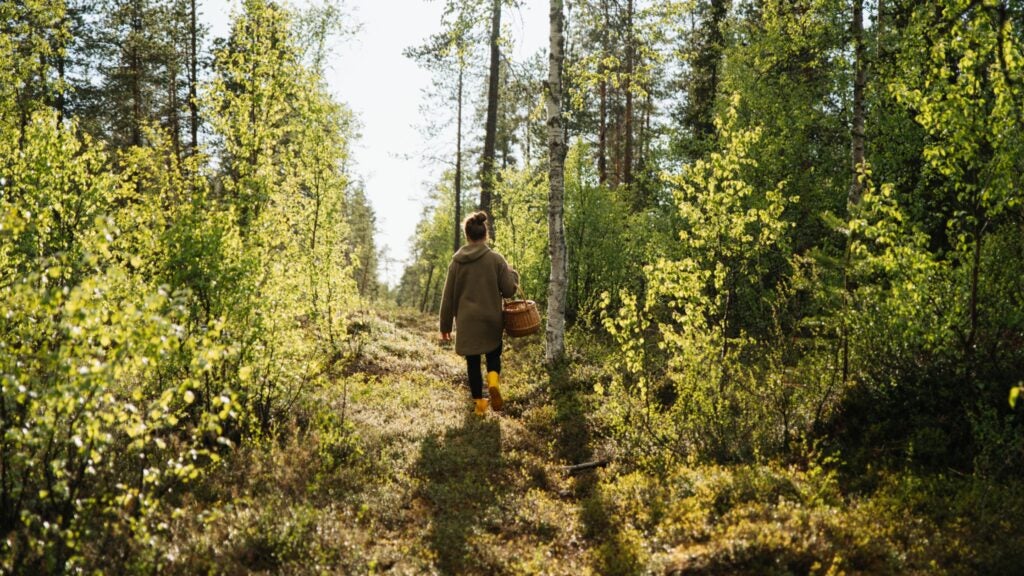
A buddy who, like me, birthed her first little one right into a pandemic-constricted world, just lately stated one thing I can’t neglect: one of many methods a girl learns to acknowledge herself as a mom is for others to see her taking part in this new position. She was lamenting the early lack of that self-recognition, attempting to explain why it was so tough to hold a new child by way of such a profound second of upheaval.
She received me fascinated with different methods of seeing and being seen, and about studying as a reciprocal act—the way it grounded me when a lot else didn’t. Generally a personality is so stunningly acquainted they maintain up a mirror to the reader. That reflection can make clear whereas additionally opening the door to fascinated with oneself in another way, maybe extra expansively. One thing like: If my literary doppelganger can do it, maybe so can also I.
I’ve lengthy been drawn to books by adventuresome girls, moms particularly. I like the way in which they have an inclination to combine particulars of quotidian life—the pungent tang of scorching garlic, the quietude that comes from folding garments, the creak of floorboards beneath socked ft, all of the day-to-day care that makes creation potential—with a eager consideration to the exterior world—the pitch pines bending within the storm wind, the shiny dew dripping from sphagnum moss within the swamp. I like that they nest these two seemingly distinct worlds alongside each other, insisting that they needn’t be separate, regardless of all now we have been taught about the place a girl belongs. However maybe what I recognize most is how they educate us to think about mothering as motion: the duty of increasing the kid’s world in order that they will encounter threat in a managed manner, earlier than having to navigate the unknown on their very own. This lesson is more and more necessary to embrace as our earth suggestions ever extra in the direction of the uncharted.
After I was 23 years outdated, I rode my bicycle from Seattle, out the Olympic Peninsula, over to Vancouver Island and the Queen Charlotte Islands, then up the Cassiar Freeway to Skagway, Alaska. It took me a bit of beneath two months, and for more often than not I used to be alone, apart from the corporate of the books that rotated by way of my overstuffed panniers. Each night I might rip out the pages I completed the day earlier than, typically utilizing them to start out a campfire. By the point I’d reached Prince Rupert I had incinerated all of Anna Karenina. Within the Museum of Northern Canada I used to be fortunate sufficient to come across The Curve of Time by M. Wylie Blanchet, who, when widowed in 1927, packed her 5 youngsters onto a 25-foot boat and cruised the coastal waters of British Columbia summer season after summer season.
I used to be nowhere close to able to have a toddler again then, however one thing about this e-book made me notice that I’d at some point. To be a mom didn’t should imply ceasing to discover, nor does it imply the tip of dish responsibility: in The Curve of Time they deal with theirs—one cup, one plate every—by dunking them over the facet. With their boat Caprice serving as dwelling base, Blanchet and her gaggle navigate the white water roiling across the notorious Deception Move; they encounter cougars and shiners and even an orca they nickname named Henry. The world they inhabit is, she writes, “each broad and slender—broad within the immensity of the ocean and mountain; slender in that the boat was very small, and we lived and camped, explored and swam in a bit of realm of our personal making.” A mom is above all else, a world creator, the boundaries of which develop with on daily basis the kid grows.
One afternoon Blanchet fishes for trout utilizing an unripe huckleberry as bait whereas the kids play on a close-by seaside. Out of the blue, she realizes they’re past what Samanta Schweblin, one other adventuresome author-mother, calls “rescue distance.” Blanchet rushes again by way of thickets of dense devils membership. The youngsters report {that a} man has been watching them for hours. The mom turns to look and the being drops to all fours and begins ambling in the direction of them, a she-bear, guarding her personal cubs. Blurry are the boundaries between human and the more-than-human on this e-book. Blanchet abandons the trout she procured, ushers everybody into their skiff, and rows again to Caprice the place collectively they take up the duty of fishing for supper. There isn’t any area the place threat is absent in The Curve of Time—not for Blanchet and her kids, not for the Pink Snapper they pull from the deep.
Blair Braverman, den mom to dozens of joyful huskies that canine sled fans know because the Ugly Canine, tackles the query of the way to survive in a deadly world in her third e-book, Small Sport. I learn Small Sport almost twenty years after I learn The Curve of Time. I used to be staying at Timberline Lodge, a Works Progress masterpiece, with a pricey outdated buddy; the 2 of us taking a brief break from tending to our personal rising broods. Our days full of the quiet ecstasy of snowshoeing or snowboarding in ft of valuable powder, our evenings spent studying luxuriously alongside a large fire that appeared prefer it belonged in Sport of Thrones.
The characters in Small Sport have none of those luxuries. As a substitute they’re whisked by a helicopter to an undisclosed location in a northern forest and tasked with constructing a brand new civilization from the bottom up. They’ve been chosen for a survivalist actuality tv present, the place every individual has one device—a pot, a knife, a bow drill for beginning fires—and a canvas tunic. The concept is that their single biggest useful resource is one another, that’s, if they will be taught to get alongside regardless of being hungry, and chilly, and drained, and greater than the rest, scared. The e-book grew from Braverman’s real-life expertise on Bare and Afraid, the weeks she spent in a South African desert attempting to wrest energy from the filth whereas elephants and hyenas circled their camp. At night time the digicam crew would go away, which left her questioning, What in the event that they by no means come again?
One morning, the characters in Small Sport wake into the world Braverman most feared. It takes them days to just accept that the foundations have shifted; they’re now not performing for an imaginary viewers and surviving is now not a recreation. As I learn, Mount Hood moved out and in of the fog. Again dwelling, my husband cooked raviolis for 2, cooked pork chops for 2, reheated leftovers for 2. I appreciated how stripped-down the world of Small Sport was, the way it emphasised the relationships between folks as they navigated one thing tough that in the first place appeared like one thing they elected then later didn’t. Some a part of that felt like an analogy for parenthood: typically the bottom shifts irrevocably beneath your ft, and the way you climate that change has all the things to do with who’s in your crew. Keep alert, the e-book urges, and open, in any other case you lock out these you most want.
Months later, as snow softened into snowdrops, I cracked open Camille Dungy’s Soil: The Story of a Black Mom’s Backyard. In 2013, Dungy accepted a place at Colorado State College, which meant relocating her husband and younger daughter to Fort Collins, a city the place only one.5 p.c of residents are Black. They purchase a house, and Dungy decides to alter the monochromatic lawn-scape that the earlier residents left behind into one thing brighter, much less reliant on damaging pesticides, and extra resilient to the world’s fickle climate. She rips out sod and replaces it first with a lasagna of compost and cardboard (to chop again on weeds) then with purple gossip, Nattall’s larkspur, prairie mallow, wine-cups and little bluestem grass. She is attempting to show her daughter one thing about the way to domesticate, if not security precisely—since a life free from hurt is simply one other story we like to inform ourselves—then an intricate community of care by which nice flourishing would possibly unfold.
Soil is a direct response to a centuries-long environmental literary custom that Dungy paraphrases as: La la la! Strolling by way of the woods. No person to consider however me! This custom treats nature as one thing exterior to a human, which should be sought out and skilled individually from the each day drone of sustaining life. If I’m being sincere, it’s a mindset that I, no less than partially, sought once I set out for Alaska alone: time to be in my physique with out taking part in another roles. Dungy will get it: “Perhaps I don’t see moms within the canon of environmental literature” she writes, “as a result of it’s unattainable for many moms to create a world the place they’ve no person to consider however themselves.”
Dungy’s writing is usually interrupted—by the cloy crucial, What’s for dinner; by the coronavirus; by the sudden want to scrub corrupted smoothie juice off the cupboards; by white buddies and colleagues who usually insist on being blindsided by our nation’s deep and steady dedication to racism as certainly one of its defining logics; by the mid-week supply of a mound of soil wanted to get her effort to reclaim the backyard underway. Every interruption felt revolutionary. It was all so acquainted, and but I couldn’t consider many different locations the place I had encountered such a plain accounting of the mother-writer’s life, the numerous concurrent threads woven by way of it that collectively create a robust—however maybe not impervious, maybe typically frayed—cloth.
There have been many passages in Soil that jogged my memory that a number of the most motherly issues—getting on arms and knees to carry a brand new child into this world or to minister to what grows up from the loam, the shepherding of all matter of being by way of unprecedented downpours and killing warmth, the continued seek for sustenance, each bodily and religious—are, fairly actually, a number of the most difficult and enchanting experiences an individual can conjure. To place maybe too blunt some extent on it: within the backyard, Dungy ventures into the unknown, exploring the dangerous work of attempting to “develop one thing lovely from what would possibly seem to be filth.” Generally she labors with somebody—her daughter, her husband—typically she doesn’t. At all times she is a mom. Soil quietly insists that mothering is among the many most fixed and unattainable, most perilous and rewarding adventures an individual can undertake. That despite the fact that we might wax philosophic about unaided makes an attempt to cross Antarctica on foot or summit K2, no life is feasible with out the beneficiant present of others’ our bodies and time, and that the concept of being alone within the forest is, above all, a farce. Our moms introduced us right here.
Supply Hyperlink : risewinter88.com

